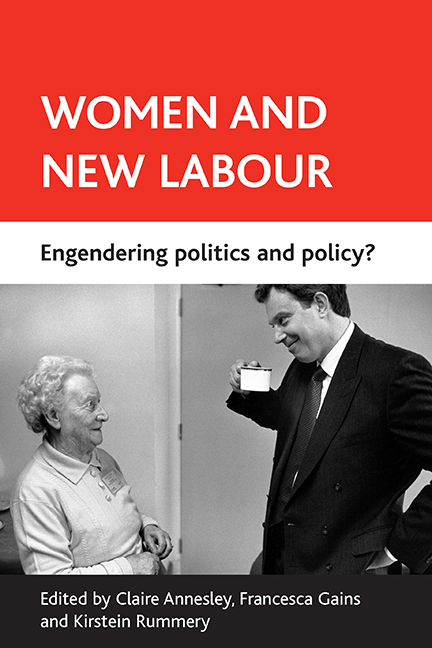five - Engendering the machinery of governance
Published online by Cambridge University Press: 15 September 2022
Summary
Introduction
This chapter focuses on the opportunities taken by New Labour in power to engender the machinery of governance at national and local levels both in terms of representational policies and in changes to the organisation of the executive and other administrative policies. These types of policies are often described as the machinery of government (Massey 1995). Here we describe these changes as relating to the machinery of governance to reflect the devolved and distributed decision-making arenas of the contemporary British state (Flinders 2002). These administrative policies provide the context for policy-making in other substantive policy areas such as those discussed in Part Three of this book.
We begin by examining changes to the representation policies in the UK, Scottish and Welsh legislatures, in local government and the non-elected state. We then move on to explore the way in which executive and administrative policies under New Labour have been engendered not only through the establishment of a Women's Policy Unit and mainstreaming policies but crucially through the agency of individual policy actors in the Cabinet and the work of their departments.
We conclude that over the longer term there is some evidence from the experience of the national legislatures that a critical mass of women representatives will change the conduct of political business and place women's issues higher on the agenda. However, in any assessment of the impact of machinery of governance changes in New Labour's first two terms, we argue the focus only upon ‘Blair's babes’ misses an appreciation that the greatest impact on policy outcomes arises from the very local level in the work of social entrepreneurs in the non-governmental sector and individual feminist Cabinet members heading departmental resources and acting in allegiance with the core executive, notably with actors in the Treasury.
Women's formal representation in politics
Much of the now extensive literature about the role and position of women in politics focuses on the issue of representation. The arguments for better representation are set out in Chapter Two here (see also Childs 2002b). Although Britain has managed a gradual, if somewhat differentiated increased of women in political institutions, women still only constitute 19.8% of the British legislature, less than many other developed states and European partners (see Table 5.1). The Labour Party is the only political group hitherto to seek to increase levels of representation (see Chapter Four).
- Type
- Chapter
- Information
- Women and New LabourEngendering Politics and Policy?, pp. 93 - 114Publisher: Bristol University PressPrint publication year: 2007
- 1
- Cited by



